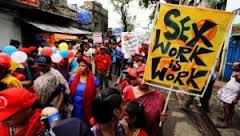
New Delhi, July 27: The Supreme Court today modified one of its order on welfare and rehabilitation of sex workers on the Centre's submissions that the last year's order gave an impression that it seeks to legalize prostitution.
Allaying the Centre's fears that it was giving its seal of approval to prostitution, a special bench of justices Altamas Kabir and Gyan Sudha Misra modified its earlier order, saying "the modification shall not be construed that by this order any encouragement is being given to prostitution."
Modifying its earlier order, the bench clarified that it would only examine the "conditions conducive for sex workers to work with dignity in accordance with provisions of Article 21 of the Constitution."
It added it was keen that sex workers should be given opportunity to avail rehabilitation measures of the government and other agencies for them.
While adjudicating a petition for rehabilitation of former sex workers, the apex court had on July 19, 2011 framed three terms of reference.
Appointing a broad-based panel to look into the matter, the apex court by its July 2011 order had formulated three questions related to prevention of trafficking, rehabilitation of sex workers who wish to leave the sex work and "conditions conducive for sex workers who wish to continue working as sex workers with dignity."
On the Centre's submission that the third term gave an impression that prostitution has been sought to be legalised, the apex court modified it to read as "conducive for sex workers to live with dignity in accordance with the provisions of Article 21 of the Constitution".
"The above modification shall not be construed that by this order any encouragement is being given to prostitution," the bench added.
Justice Sudha also observed, "While we do not wish to encourage sex trade we would emphasise rehabilitation of sex workers for which we had taken the issue.
"We wish to add although the sex workers have right to live with dignity. There has to be collective endeavours by courts and sex workers to give up flesh trade in case they are given alternative platform on employment."





Comments
Add new comment